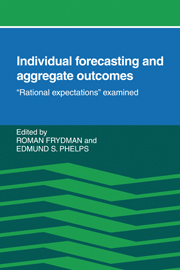Book contents
- Frontmatter
- Contents
- List of contributors
- Preface
- 1 Introduction
- 2 The trouble with “rational expectations” and the problem of inflation stabilization
- 3 Expectations of others' expectations and the transitional nonneutrality of fully believed systematic monetary policy
- 4 The stability of rational expectations in macroeconomic models
- 5 Individual rationality, decentralization, and the rational expectations hypothesis
- 6 Convergence to rational expectations equilibrium
- 7 A distinction between the unconditional expectational equilibrium and the rational expectations equilibrium
- 8 On mistaken beliefs and resultant equilibria
- 9 Equilibrium theory with learning and disparate expectations: some issues and methods
- 10 Keynesianism, monetarism, and rational expectations: some reflections and conjectures
- Index
8 - On mistaken beliefs and resultant equilibria
Published online by Cambridge University Press: 05 June 2012
- Frontmatter
- Contents
- List of contributors
- Preface
- 1 Introduction
- 2 The trouble with “rational expectations” and the problem of inflation stabilization
- 3 Expectations of others' expectations and the transitional nonneutrality of fully believed systematic monetary policy
- 4 The stability of rational expectations in macroeconomic models
- 5 Individual rationality, decentralization, and the rational expectations hypothesis
- 6 Convergence to rational expectations equilibrium
- 7 A distinction between the unconditional expectational equilibrium and the rational expectations equilibrium
- 8 On mistaken beliefs and resultant equilibria
- 9 Equilibrium theory with learning and disparate expectations: some issues and methods
- 10 Keynesianism, monetarism, and rational expectations: some reflections and conjectures
- Index
Summary
Recently, with the growing interest in the notion of rational expectations and with the emphasis on the influence of expectations on inflation, the literature on these subjects has raised, not always explicitly, a fundamental problem for economic theory. This question may be phrased as follows. If agents in an economic model start out with personal, possibly mistaken, beliefs and then learn, to what extent will their learning lead them to a knowledge of the true situation, and will they be led to an equilibrium corresponding to a situation in which they have complete information? This question is not as trivial as it might appear precisely because of the nature of economic situations. Agents learn by observing and modifying their behavior in consequence, but in most economic situations what they observe is conditioned by their own behavior. This feedback and its consequences were explicitly discussed in a recent study by Bray (1981). In that study, despite mistaken beliefs, the agents are led to a rational expectations equilibrium, that is, one in which their subjective beliefs coincide with the objective situation. However, at each point in time before reaching the equilibrium there is a discrepancy between the two. In other cases it is easy to see that the feedback mechanism may prevent convergence occurring at all. Another alternative, one that is the main subject of this chapter, is that the model may be led to an outcome that is unrelated to any “real” equilibrium.
- Type
- Chapter
- Information
- Individual Forecasting and Aggregate Outcomes'Rational Expectations' Examined, pp. 147 - 168Publisher: Cambridge University PressPrint publication year: 1984
- 9
- Cited by

